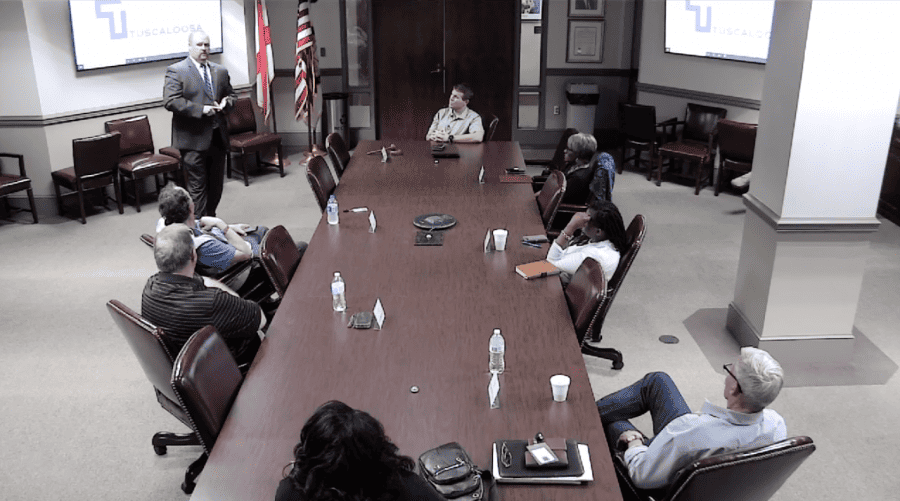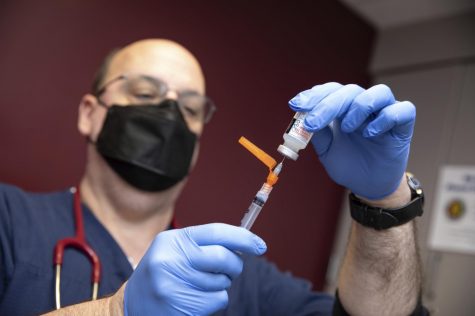City leaders: ‘Keep your kids’ home as community fights coronavirus
March 19, 2020
Frustrations boiled over in a special city council meeting on Thursday night when city councilors met to address an apparent flaw in Tuscaloosa’s current quarantine system: Juveniles aren’t taking the coronavirus pandemic seriously.
Talks of a curfew loomed as city leaders spoke with Tuscaloosa police chief Brent Blankley about how to keep people indoors while also keeping their children at bay. Blankley expressed his frustration regarding the juggle he’s faced between employing officers and keeping the station clear. The issue that comes with this is making sure Tuscaloosa’s streets stay safe, but this becomes near impossible when juveniles refuse to stay home.
“Young people may have a higher survivability,” Mayor Walt Maddox said. “But like [District 5 councilor] Mr. [Kip] Tyner said, their interaction with mom, grandmother and dad and granddad can create huge issues … It’s not only an issue of preventing crime, but it’s preventing a public health crisis within our community.”
A common narrative circulating social media assures that the state of Alabama has lower-than-average reported cases of COVID-19, so its citizens must be fine. This is not true. Testing in Alabama is currently at a fraction of what larger states like New York and California and countries like Italy and South Korea have done in the past two months, so the numbers of reported versus actual cases may be much farther off than the surface indicates.
“From the Alabama Department of Public Health to the CDC, they believe the virus is out in the community, it’s being spread person to person,” Maddox said. “We as a city, and our citizens, we have to begin the mindset that this might be a three- to six-month process.”
Maddox projects that it will only take a 3% infection rate, or 6,000 people, to cripple Tuscaloosa County’s medical facilities. If 20% of those carriers (about 1,200 people) were to become critically ill, Maddox worries that local hospitals will not have the resources to treat everyone. And, his math checks out: With only 700-800 beds at DCH Regional Medical Center – 10-15% of which are ICU-capable – a 3% infection rate will inevitably oversaturate all of Tuscaloosa County’s medical resources.
“Today, when it’s a sunny day and life seems normal, it’s hard to imagine what life could look like two weeks from now,” Maddox said. “So it’s hard to understand why professionals are saying, ‘Be ready.’”
Communication will be vital in the upcoming weeks. The virus will not be stopped unless every citizen takes its severity seriously, according to the mayor. With the worry that low-income community members are being unintentionally excluded from the updates the city and media members disseminate, the council brainstormed how to deliver information in an effective way, with ideas ranging from billboard advertisements to Amber Alert-style mobile messages.
Over the past few weeks, Maddox has stressed that fear poses the greatest threat to communities facing a public health crisis. While some lack access to mainstream channels of communication, misinformation has also played an instrumental role in inducing panic. One common myth is the threat of a nationwide quarantine, which President Donald Trump dispelled earlier this week. Maddox said he doesn’t see a national quarantine being enforceable in smaller locales, but warned that completely eradicating the virus and returning to normalcy will not take weeks, but months.
Beyond this, concerns regarding voluntary corporation closures worry leaders moving forward. With rumors circulating that businesses as large as Walmart may close for cleaning and staff wellbeing, it is a dicey shuffle to see which businesses risk its employees and patrons contracting and spreading the virus and stay open to further serve the community.
“We’ve gotta have some grocery stores,” District 7 councilor Sonya McKinstry said.
The most critical issue, however, is convincing folks to remain indoors and away from others. Maddox asserted that the longer this is disobeyed, the farther Tuscaloosa County will stray from recovery.
“Even here in Tuscaloosa, I’m dealing with grandparents and parents and guardians that don’t have access to internet or cable, and they’re still not knowledgeable,” District 2 councilor Raevan Howard said. “[One resident] did not understand that this was a serious issue for the city of Tuscaloosa. They have children in that home that are a part of that population, being involved in delinquent behavior, and I feel like we have to take the most drastic measures to stop it.”
“Delinquent groups” refer to antsy minors who are congregating in larger-than-allowed numbers in public spaces like parks and recreational facilities. These gatherings, according to Howard and Blankley, often end in fights, illicit and illegal activities. Maddox and Howard discussed with Blankley about how to curb the spike in juvenile crime, but a concrete action plan is still not clear.
While city leaders tossed around the idea of a curfew, Blankley warned against such a measure. The 911-call system would be overwhelmed at a time where it’s needed most, and mass citations and arrests would distract his force from everyday duties. McKinstry noted that it would take “drastic measures” to flatten the curve, including holding parents accountable.
“They’re looking at this time off as a vacation,” McKinstry said. “I would hope that they would wake up before we’re at capacity with the hospital. I just wish there was a way that we could say, parents, we need you to help us. We didn’t close the precincts to go babysit the parks.”
The police department may not have the same option of indefinitely suspending operations like other local businesses. But, Blankley assured that no measure of quarantine will be too much for his officers to handle.
“We have to do our job,” he said. “My department will enforce it to the best of our ability.”
McKinstry wrapped up the meeting with an impassioned message directed toward Tuscaloosa’s guardians.
“Keep your kids [home]; we’ve got other things to do,” she said. “If you have more than 25 people and they’re closer than six feet, you are in violation of [the emergency order’s guidelines]. We should put y’all in jail, but we can’t do that.”
McKinstry stressed that in this national crisis, the city government cannot be legislators, enforcers and caretakers. It is going to take effort from every Tuscaloosan to reach recovery.
“We shouldn’t have to have a called meeting just to talk about [guardians],” she continued. “We need all the help we can get. This is a national crisis, and whether you get it now or whether you get it later, we cannot babysit, and we don’t want to punish the kids, but, you know, it’s time for people to do their part. We shouldn’t have to be saying, ‘Figure another way for churches to have your service.’ The government has spoken. We shouldn’t have to interpret that.”
While business closures may be distressing for employees and owners, understanding the grave nature of the shutdowns and responding appropriately is a major way to stymie the virus’ impact. McKinstry offered a message to business owners as well.
“If you’re at a salon, you can’t do my hair six feet away,” McKinstry said. “So that means [quarantine] applies to you. Everybody is suffering. Everybody is having this same hardship … Hopefully people will just wake up.”









